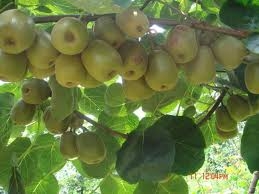
Rural lending specialist Rabobank says it's "carefully monitoring" the "particular challenges" being faced by the kiwifruit and wine sectors, but remains committed to both over the long-term.
The bank made these comments in a press release on its 2011 financial results, which follows last week's release of its latest general disclosure statement showing a slow down in lending growth in the final three months of 2011.
Rabobank's annual net profit after tax fell NZ$18.1 million, or 25%, to NZ$53.8 million due to rising costs, tighter net interest margins and one-off factors boosting the 2010 results.
Ben Russell, Rabobank's New Zealand CEO, said the bank retains a strong medium to long-term growth outlook for New Zealand’s food and agribusiness sector, although significant volatility remains on commodity markets and in the wider economic environment.
Read Rabobank's full statement below:
Rabobank New Zealand Limited (RNZL) continued to build its rural banking business in 2011, recording net lending growth of $724 million, despite a contraction in the total rural debt market over the same period.
Rabobank New Zealand CEO Ben Russell said the bank’s rural portfolio growth during 2011 was a positive result which primarily reflected refinance activity rather than organic growth of existing customers.
“Many farmers took the opportunity to repay debt and consolidate their financial position in 2011, with a combination of high commodity prices, a good season across much of New Zealand and low interest rates,” he said.
Mr Russell said Rabobank was “very pleased with the rural portfolio growth as it reflects the strategy and ambitions of the bank within New Zealand”.
“Rabobank has pursued a strategy of sustainable growth in both rural lending and retail deposits in recent years and good progress was made on both counts,” he said.
Rabobank made significant investment in its rural banking and RaboDirect businesses in 2011 with overall expense growth of 18 per cent reflecting recruitment of new employees, re-development of critical banking systems and an upgrade of its branch network and premises.
“This had included the opening of two new branches – Wanganui and Morrinsville – and relocating to new premises in Wellington, Auckland, Whangarei and Oamaru,” Mr Russell said.
RNZL posted a net profit after tax (NPAT) of $53.8 million, down from $72 million in 2010, reflecting these increased expenses, along with tighter net interest margins and a number of one-off factors contributing to the higher 2010 year’s results.
Mr Russell said all profits earned by Rabobank New Zealand were retained and reinvested in the local market.
From a risk perspective 2011 was a positive year, Mr Russell said, with overall impaired assets remaining stable despite the strong portfolio growth, and loan provisions falling from $34.7 million to $32.7 million, including an increase in collective provisions due to the bank’s exposure to the kiwifruit sector.
Rabobank New Zealand’s cost to income ratio of 46.4 per cent, while higher than 2010, reflected the increased investment and remained comparable to major banks in New Zealand.
Other achievements for the year included market-leading levels of customer satisfaction and significantly-increased levels of brand awareness.
Rabobank continued to build its online retail investments and deposits business RaboDirect during 2011. The bank added a total of NZ$ 288.9 million in retail deposits in 2011, with a significant proportion raised through RaboDirect, Rabobank’s online retail investments and deposits arm.
“This occurred at a time of growing market competition for retail deposits as all banks seek to alter their funding mix away from short-term wholesale funding toward a combination of retail deposits and long-term funding,” Mr Russell said.
Looking ahead, Rabobank retains a strong medium to long-term growth outlook for New Zealand’s food and agribusiness sector, although there remains significant volatility on commodity markets and in the wider economic environment.
Mr Russell said the particular challenges being faced by the kiwifruit and wine sectors were being carefully monitored, however Rabobank remained committed to both sectors for the long-term.
The local Rabobank New Zealand Limited results follow recent regional and global results announcements from Rabobank.
Rabobank Australia & New Zealand Group achieved a record result for 2011, posting a net profit after tax of A$211.7 million (NZ$ 270.9 million), up 15 per cent on the previous year. Global parent Rabobank Group reported a net profit of EUR 2.6 billion for 2011. While five per cent down on the Rabobank Group’s 2010 profit result, Rabobank Australia and New Zealand Group CEO Thos Gieskes said it was a very satisfactory performance in uncertain global market conditions.
“While this was a slight drop on the global Rabobank’s 2010 figures, it was a reassuringly strong result given the very difficult economic conditions,” he said.
The cooperative Rabobank Group’s strong financial status saw deposits to the bank rise by 10 per cent overall to EUR 330 billion. Importantly, the global bank maintained its robust liquidity position, raising an impressive EUR 42 billion in long-term funding. The bank’s Tier 1 capital ratio – a key measure of solvency – rose 1.3 percentage points to a very strong 17.0 per cent.
2 Comments
if I had as much exposure as Rabo, Id remain comitted too. The other option is ?
PSA is not the biggest problem for some kiwifruit orchards in the Eastern BoP.
http://www.whakatanebeacon.co.nz/cms/news/2012/03/art100011143.php

We welcome your comments below. If you are not already registered, please register to comment
Remember we welcome robust, respectful and insightful debate. We don't welcome abusive or defamatory comments and will de-register those repeatedly making such comments. Our current comment policy is here.